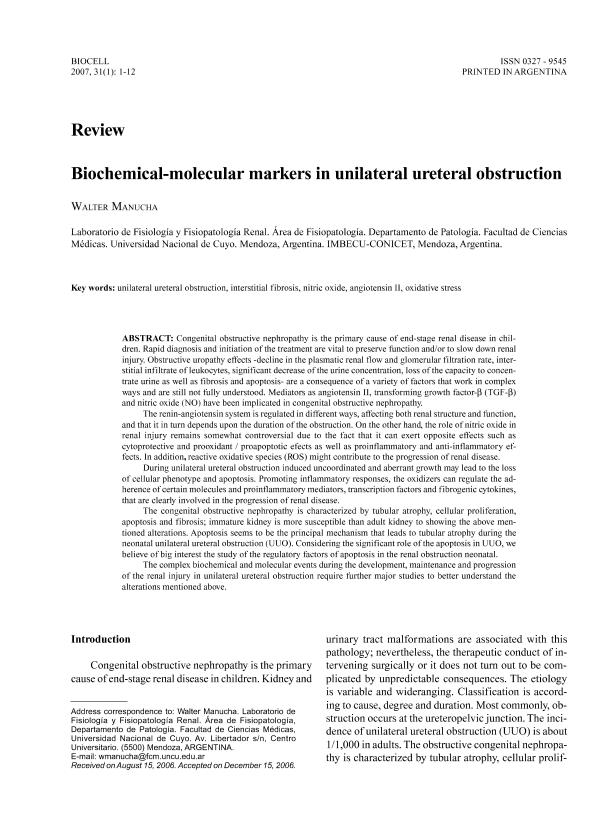Mostrar el registro sencillo del ítem
dc.contributor.author
Manucha, Walter Ariel Fernando

dc.date.available
2021-11-30T10:29:14Z
dc.date.issued
2007-12
dc.identifier.citation
Manucha, Walter Ariel Fernando; Biochemical-molecular markers in unilateral ureteral obstruction; Instituto de Histología y Embriología; Biocell; 31; 1; 12-2007; 1-12
dc.identifier.issn
0327-9545
dc.identifier.uri
http://hdl.handle.net/11336/147675
dc.description.abstract
Congenital obstructive nephropathy is the primary cause of end-stage renal disease in chil dren. Rapid diagnosis and initiation of the treatment are vital to preserve function and/or to slow down renal injury. Obstructive uropathy effects -decline in the plasmatic renal flow and glomerular filtration rate, inter stitial infiltrate of leukocytes, significant decrease of the urine concentration, loss of the capacity to concen trate urine as well as fibrosis and apoptosis- are a consequence of a variety of factors that work in complex ways and are still not fully understood. Mediators as angiotensin II, transforming growth factor-β (TGF-β) and nitric oxide (NO) have been implicated in congenital obstructive nephropathy. The renin-angiotensin system is regulated in different ways, affecting both renal structure and function, and that it in turn depends upon the duration of the obstruction. On the other hand, the role of nitric oxide in renal injury remains somewhat controversial due to the fact that it can exert opposite effects such as cytoprotective and prooxidant / proapoptotic efects as well as proinflammatory and anti-inflammatory ef fects. In addition, reactive oxidative species (ROS) might contribute to the progression of renal disease. During unilateral ureteral obstruction induced uncoordinated and aberrant growth may lead to the loss of cellular phenotype and apoptosis. Promoting inflammatory responses, the oxidizers can regulate the ad herence of certain molecules and proinflammatory mediators, transcription factors and fibrogenic cytokines, that are clearly involved in the progression of renal disease. The congenital obstructive nephropathy is characterized by tubular atrophy, cellular proliferation,apoptosis and fibrosis; immature kidney is more susceptible than adult kidney to showing the above men tioned alterations. Apoptosis seems to be the principal mechanism that leads to tubular atrophy during the neonatal unilateral ureteral obstruction (UUO). Considering the significant role of the apoptosis in UUO, we believe of big interest the study of the regulatory factors of apoptosis in the renal obstruction neonatal.The complex biochemical and molecular events during the development, maintenance and progression of the renal injury in unilateral ureteral obstruction require further major studies to better understand the alterations mentioned above.
dc.format
application/pdf
dc.language.iso
eng
dc.publisher
Instituto de Histología y Embriología

dc.rights
info:eu-repo/semantics/openAccess
dc.rights.uri
https://creativecommons.org/licenses/by-nc/2.5/ar/
dc.subject
UUO
dc.subject
APOPTOSIS
dc.subject
FIBROSIS
dc.subject
NO
dc.subject.classification
Urología y Nefrología

dc.subject.classification
Medicina Clínica

dc.subject.classification
CIENCIAS MÉDICAS Y DE LA SALUD

dc.title
Biochemical-molecular markers in unilateral ureteral obstruction
dc.type
info:eu-repo/semantics/article
dc.type
info:ar-repo/semantics/artículo
dc.type
info:eu-repo/semantics/publishedVersion
dc.date.updated
2021-02-03T13:25:36Z
dc.journal.volume
31
dc.journal.number
1
dc.journal.pagination
1-12
dc.journal.pais
Argentina

dc.journal.ciudad
Mendoza
dc.description.fil
Fil: Manucha, Walter Ariel Fernando. Consejo Nacional de Investigaciones Científicas y Técnicas. Centro Científico Tecnológico Conicet - Mendoza. Instituto de Medicina y Biología Experimental de Cuyo; Argentina
dc.journal.title
Biocell

dc.relation.alternativeid
info:eu-repo/semantics/altIdentifier/url/http://www.scielo.org.ar/scielo.php?pid=S0327-95452007000100001&script=sci_abstract
Archivos asociados
